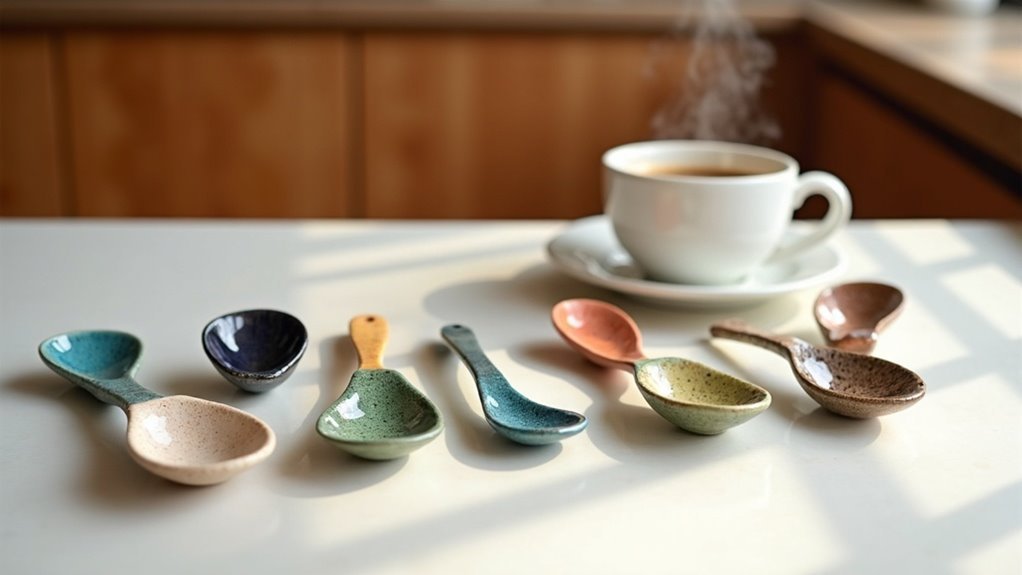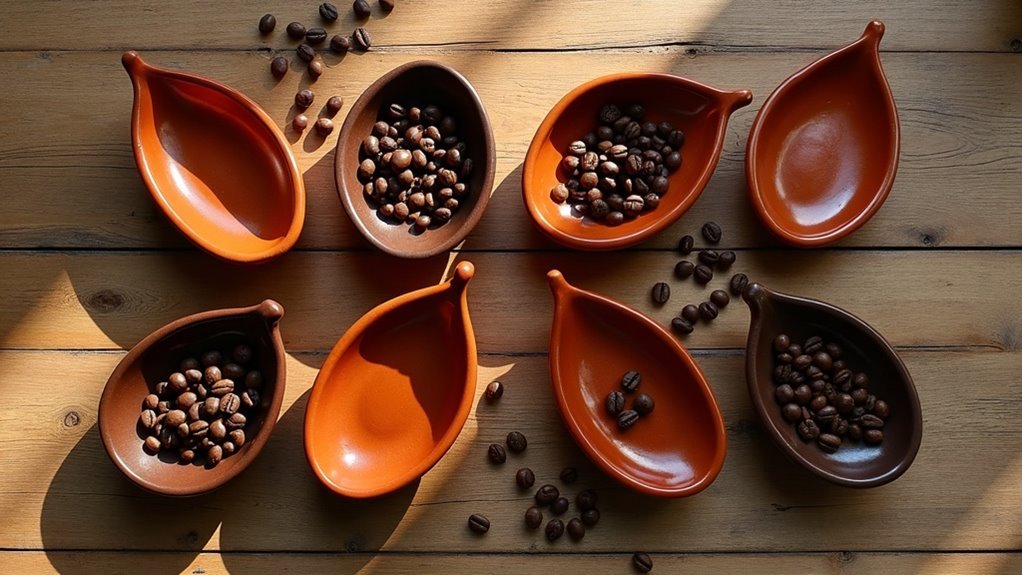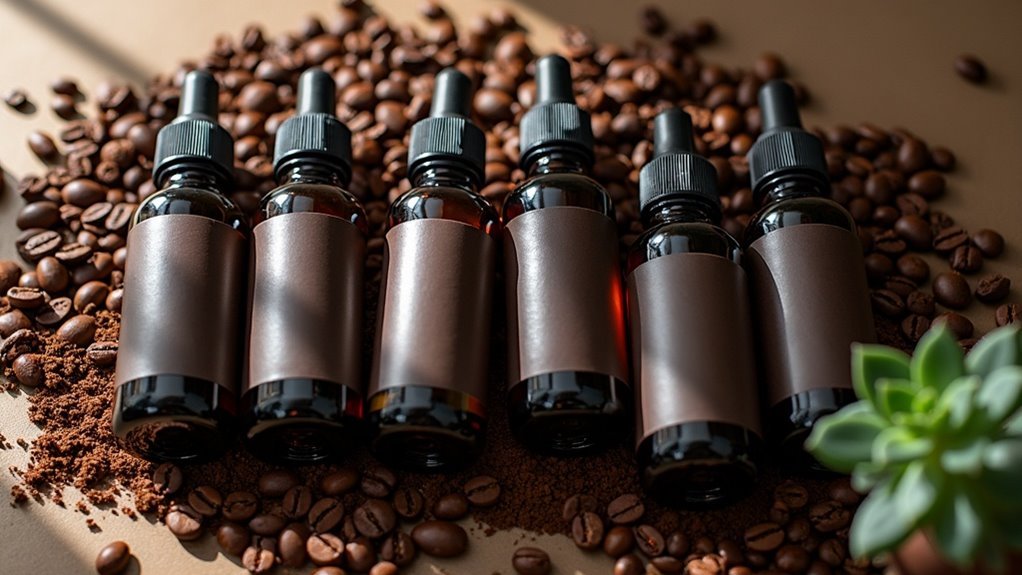Mokka coffee varietal, originating from Yemen, is highly regarded for its small, round beans and rich, complex flavors. This exceptional coffee is derived from a mutation of the Bourbon varietal and features a distinct heavy body with chocolaty and subtle spice notes. Mokka trees produce fewer beans, resulting in a labor-intensive harvesting and processing method. Consequently, it is often considered a premium choice for coffee enthusiasts. There’s much more to explore regarding its unique growing conditions and processing techniques.
Key Takeaways
- Mokka coffee varietal has its roots in Yemen and is associated with the historic port of Mocha, which was a significant hub for coffee trade.
- Mokka beans are distinctive for their small and round shape, measuring two to three screen sizes smaller than typical coffee beans.
- The Mokka tree is characterized by its bushy appearance and low yield, producing only 200-300 viable beans per 500 trees, which presents challenges for cultivation.
- Mokka is processed using Natural Anaerobic methods, which enhance its flavor profile but also increase production costs, positioning it as a premium option in the coffee market.
- Renowned for its heavy body and rich chocolaty flavors, Mokka coffee is best enjoyed when brewed with methods such as French press, espresso, or cold brew.
Origins and History of Mokka
The Mokka coffee varietal has its origins in Yemen, named after the historic port of Mocha, which was a crucial center for global coffee trade from the 15th to early 18th centuries.
This unique varietal is thought to be a mutation of the Bourbon varietal, with its first documentation occurring before 1935. In the 1980s, researchers at the University of Hawaii studied Mokka’s potential, leading to the development of a hybrid called “Tall Mokka.”
Mokka coffee, a Bourbon mutation, was documented before 1935 and later led to the hybrid known as “Tall Mokka.”
Notably, Mokka coffee beans are distinguished by their small size, which presents challenges during harvesting.
Additionally, the Maui Mokka, which comes from a single tree, represents a rare cultivar that’s seldom found outside of Maui.
Characteristics of Mokka
Mokka coffee beans are distinctive for their unique small size, akin to split peas, which greatly influences their flavor profile.
The diverse taste characteristics emerge from the lengthy maturation period and the specific Natural Anaerobic processing methods employed.
However, cultivating Mokka can be challenging due to its bushy structure and low yield, which complicate cultivation efforts.
Unique Bean Size
Distinctive in size, Mokka coffee beans are particularly smaller and rounder than those of other varieties, often resembling split peas.
These Mokka beans typically measure two to three screen sizes smaller than standard coffee beans, making their harvesting labor-intensive.
The Mokka tree, growing only 4-6 feet tall, produces cherries that yield a low number of healthy beans, with only 200-300 out of 500 trees on a farm being viable.
This rarity, combined with their long maturation period of six months, underscores the significance of their small size, which is well-suited for natural processing methods that enhance their rich and unique flavor profile, making them a sought-after choice for coffee enthusiasts.
Flavor Profile Diversity
While exploring the flavor profile diversity of Mokka coffee, you’ll discover a heavy-bodied brew that’s rich in chocolatey nuances, complemented by subtle hints of dried fruit and spices. The natural processing method brings out a floral quality, while the long maturation period enhances its complexity. The unique size of Mokka beans adds to its distinctiveness, and its lower caffeine content makes it appealing for those seeking a milder experience.
| Characteristic | Description |
|---|---|
| Body | Heavy-bodied |
| Flavor Notes | Chocolatey, dried fruit, spices |
| Processing | Natural, enhances floral qualities |
| Caffeine Content | Lower than typical Arabica cultivars |
Growing Conditions Challenges
The unique flavor profile of Mokka coffee is deeply influenced by its challenging growing conditions.
This coffee variety is bushy, reaching heights of 4-6 feet, yet it yields poorly, with only 200-300 healthy trees out of 500.
The cherries’ long maturation period of about six months complicates cultivation, while their susceptibility to rain and humidity introduces risks such as excess soil moisture and tree loss.
Additionally, harvesting Mokka cherries is labor-intensive due to their small size, requiring multiple collection passes.
These challenges significantly impact the overall quality and availability of Mokka coffee, making it a rare and highly sought-after varietal among coffee enthusiasts.
Challenges in Growing Mokka
Growing Mokka coffee presents several challenges that can deter even seasoned farmers.
The Mokka tree is low yielding, typically producing only 200-300 healthy trees per 500 planted. Its susceptibility to rain and humidity can lead to significant tree loss in excessively moist conditions.
The Mokka tree’s low yield and vulnerability to moisture create significant challenges for coffee farmers.
Additionally, the cherries take six months to mature, demanding patience and diligent monitoring. Harvesting Mokka is labor-intensive due to the small size of the cherries, requiring multiple passes for effective collection.
Recent years have highlighted fluctuating production levels, with the best harvest in 2018 followed by disappointing yields in 2020 and 2021, complicating overall viability and making it a challenging venture for coffee growers.
Processing of Mokka
When you examine the processing of Mokka coffee, you’ll find it employs Natural Anaerobic processing, which controls fermentation through airtight conditions.
This meticulous method, involving submersion in water and a careful drying period, greatly impacts the flavor profile of the coffee.
The labor-intensive nature of these techniques not only enhances the coffee’s distinct chocolatey notes but also raises production costs, making Mokka coffee a unique and premium choice for coffee enthusiasts.
Natural Anaerobic Processing
Natural Anaerobic processing of Mokka coffee is a meticulous method that enhances the bean’s distinctive characteristics. This technique involves sealing freshly harvested cherries in plastic bags with air removed and submerging them in water to control fermentation.
By maintaining a low, constant temperature, this process cultivates the unique flavor profile of the coffee beans. After fermentation, the cherries dry on raised beds for 21 days, ensuring ideal moisture reduction.
They’re then stored for 45 days before milling, which removes the dried cherry skin, revealing the green coffee beans. This careful handling is vital, given Mokka’s sensitive and small cherry size.
Explore the art of coffee processing and discover how these techniques influence the flavor and quality of your favorite brew!
Fermentation and Drying Techniques
Building on the careful fermentation process previously discussed, the drying techniques employed for Mokka coffee play a significant role in shaping the final flavor profile.
After fermentation, the cherries are dried on raised beds for 21 days to achieve the ideal moisture content. This meticulous process guarantees the preservation of flavors while enhancing quality.
Key aspects include:
- Natural Anaerobic processing for even fermentation
- Controlled drying conditions to prevent spoilage
- Hand-sorting of green beans for quality assurance
- Labor-intensive methods reflecting Mokka’s rarity
These steps collectively highlight the complexity of Mokka coffee, resulting in a truly unique drinking experience that coffee enthusiasts cherish.
Limited Release and Availability
As coffee enthusiasts know, the allure of Mokka coffee lies not only in its unique flavor profile but also in its scarce availability. With only twenty-five 100g lots offered, this limited supply makes it a sought-after treasure for coffee lovers. Each lot embodies the dedication of farmers, showcasing the labor-intensive cultivation processes involved. Recent years have seen low production, with the peak harvest occurring in 2018, further elevating the demand for Maui Mokka.
| Lot Size | Availability | Price Point |
|---|---|---|
| 100g | Limited | High |
| Unique | Exclusive | Premium |
| Rare | Sought-After | Valuable |
Unique Characteristics of Maui Mokka
Maui Mokka is a remarkable coffee that distinguishes itself in the industry due to its unique attributes, especially its petite beans and specialized cultivation process.
Here are some of its standout features:
- The beans are notably smaller, measuring two to three screen sizes less than standard coffee varieties.
- The Mokka tree, which is bushy and reaches heights of 4 to 6 feet, produces small coffee cherries that contribute to its distinctive flavor profile.
- This varietal is the result of a hybridization process combining Yemeni Mokka and Brazilian Typica coffee plants.
- Maui Mokka is celebrated for its heavy body, offering rich chocolaty flavors complemented by subtle hints of dried fruit and spices.
These exceptional characteristics have earned Maui Mokka recognition, including awards at the Hawaii Coffee Association’s Cupping Competition, highlighting its superior quality and taste.
Commitment to Quality and Sustainability
The exceptional qualities of Maui Mokka extend beyond its unique flavor profile to a strong commitment to quality and sustainability in its cultivation and production.
Hawaii’s craft coffee roasters emphasize ethical practices, ensuring that every cup of Mokka coffee reflects their dedication to environmental responsibility. Beans are harvested at peak ripeness, handcrafted, and milled in small batches to maintain superior quality.
Additionally, operations utilize renewable energy sources, further supporting sustainability. Partnerships with local farmers guarantee a diverse selection of authentic Hawaiian coffees, while meticulous processing and attention to detail ensure Mokka’s high-quality standards, making it a sought-after choice among coffee enthusiasts.
Flavor Profile and Brewing Recommendations
While exploring the Mokka coffee varietal, you’ll discover a flavor profile that captivates the senses with its heavy body and rich chocolaty notes, often complemented by hints of dried fruit or spices.
Discover the Mokka coffee varietal, where heavy body and rich chocolaty notes intertwine with hints of dried fruit and spices.
To fully appreciate its unique characteristics, consider these brewing methods:
- French press: Enhances the body and richness of the coffee.
- Espresso: Concentrates flavors for a bold and intense experience.
- Cold brew: Delivers a smooth, less acidic profile, perfect for a refreshing taste.
- Careful brewing: Essential, as the smaller beans yield concentrated flavors that highlight the Mokka’s distinct qualities.
These methods not only elevate the Mokka coffee varietal’s unique attributes but also cater to those seeking a lower caffeine experience without sacrificing flavor.
Enjoy the journey through the world of coffee!








